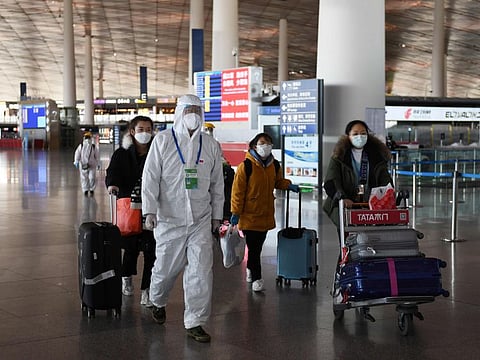China bars foreign visitors as imported COVID-19 cases rise
Suspension applies to people with visas and residence passes in bid to fight coronavirus

Beijing: China on Friday announced a temporary ban on all foreign visitors, even if they have visas or residence permits due to an increase in the number of imported coronavirus cases in the country, the epicentre of the pandemic.
A wave of coronavirus infections from people travelling into China is putting the country on edge over whether it should keep the doors open to its students and workers who live elsewhere.
Although China reported its first locally transmitted coronavirus case after three days on Friday, almost all its new cases now come from abroad, the BBC reported.
There were 55 new cases across China on Thursday of which 54 were imported.
On Friday, the Chinese Foreign Ministry said it was “suspending the entry of foreign nationals” because of the “rapid spread of Covid-19 across the world”.
The suspension applies to people with visas and residence passes, but not to diplomats or those with C visas (usually aircraft crew).
People with “emergency humanitarian needs” or those working in certain fields can apply for exceptions.
China was also limiting Chinese and foreign airlines to one flight per week, and flights must not be more than 75 per cent full.
Although the virus emerged in China, it now has fewer cases than the United States and fewer deaths than Italy and Spain.
There have been 81,340 confirmed cases in China and 3,292 deaths, the BBC quoted the country’s National Health Commission as saying on Friday.
In total, 565 of those confirmed cases were classed as “imported” — either foreigners coming into China, or returning Chinese nationals.
In Hubei — the province where the outbreak began — there were no new confirmed or suspected cases on Thursday.
The lockdown in provincial capital Wuhan, which began in January, will be eased on April 8.
Diaspora discouraged
Shaken by the almost 600 “imported” infections it’s caught after it brought its domestic case growth to zero, the Asian nation has already announced a sealing of its borders to foreigners from Saturday. But the move won’t stop the wave, given that 90 per cent of the imported virus cases are Chinese nationals returning from other countries, according to data from China’s foreign ministry.
Beijing is actively discouraging its 11 million Chinese diaspora from coming home, telling them that it would mean long delays in their studies and jobs overseas. And it’s no longer sending chartered flights to get citizens home, an about-turn from an earlier policy that saw it bring plane loads of Chinese back from Iran and Japan.
The new approach also runs counter to that taken by countries like Singapore, Australia and Canada, which have urged their citizens working and studying overseas to come home.
After bringing its epidemic under control through draconian measures that quarantined a region of 60 million people and caused a historic economic contraction, China is now fearful of a second peak as the pandemic accelerates overseas. Over 81,000 people have been infected and over 3,200 have died in China since the virus was first reported last December.
“Students may face long-term delay in their study or work if they return to China, as the outbreak may well last one or two years,” said Zhang Wenhong, a Shanghai-based Chinese epidemiologist, in an online chat with overseas Chinese students organised by the Chinese embassy in Dusseldorf, Germany, on March 17.
Zhang also told them that younger people have a lower chance of becoming seriously ill after contracting the virus.
Back to work
Some of China’s overseas citizens trying to go home are already infected and wanted to return for treatment, while others were infected during the flight. On Friday, all 54 reported new cases in China were imported, according to the National Health Commission. So far, China has reported 595 imported cases since late February.
The imported cases “undoubtedly pose a severe challenge to the results of domestic epidemic prevention and control, the pace of restarting production and work, as well as people’s safety,” the Civil Aviation Administration of China said in a March 26 statement.
The Chinese embassy in the United Kingdom said in a March 8 statement that there are no plans to send chartered flights to fly overseas Chinese home. Instead, it suggested overseas citizens try to get help where they are, for example by calling overseas Chinese organisations to help with face masks and other protective equipment. It has asked students to contact their schools to decide on how to proceed with their courses.
Liu Xiaoming, China’s ambassador in the UK, told Chinese students on March 25 that staying where they are is safer, given the potential dangers in the homebound journey. Instead of flying dozens of hours without eating or drinking, wearing gloves and masks, and then being quarantined for 14 days on arrival in China, “I think it’s better to stay.”
That, however, hasn’t stopped some Chinese students from doing whatever it takes to come back, despite skyrocketing fares, in the belief that they can’t get proper medical treatment overseas.
A female student who studies in the UK took a two-stop 51-hour journey from London to her hometown Xi’an wearing protective clothing and goggles throughout, according to a video widely circulated on Chinese social media.
“We are coming back because we rely on China’s medical treatment. It’s not to bring back the virus,” she said in the video.



